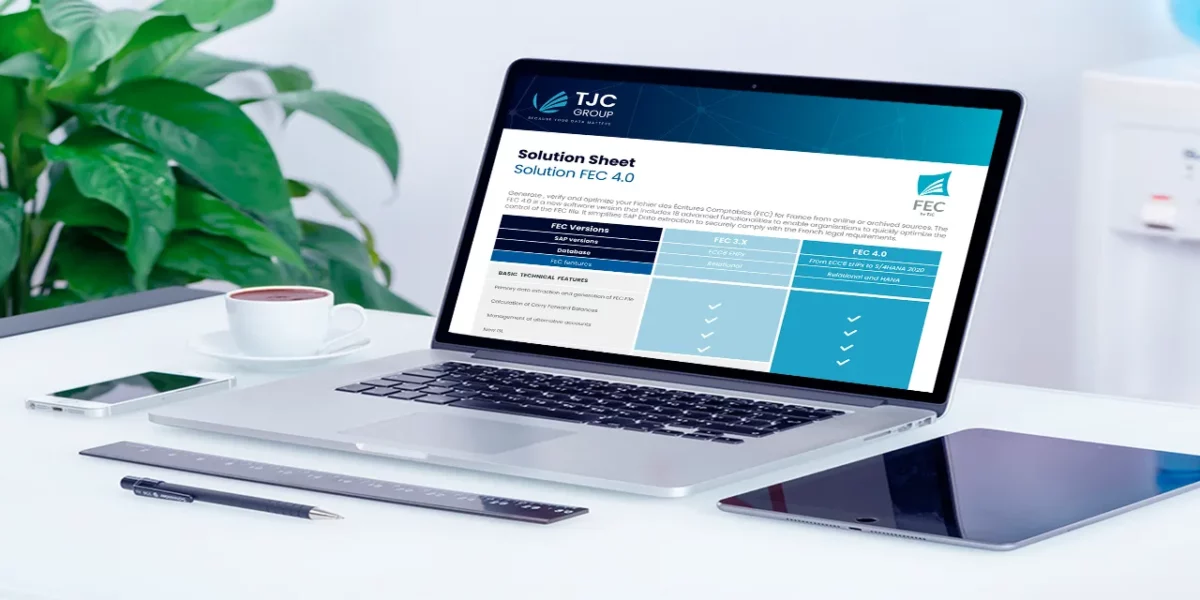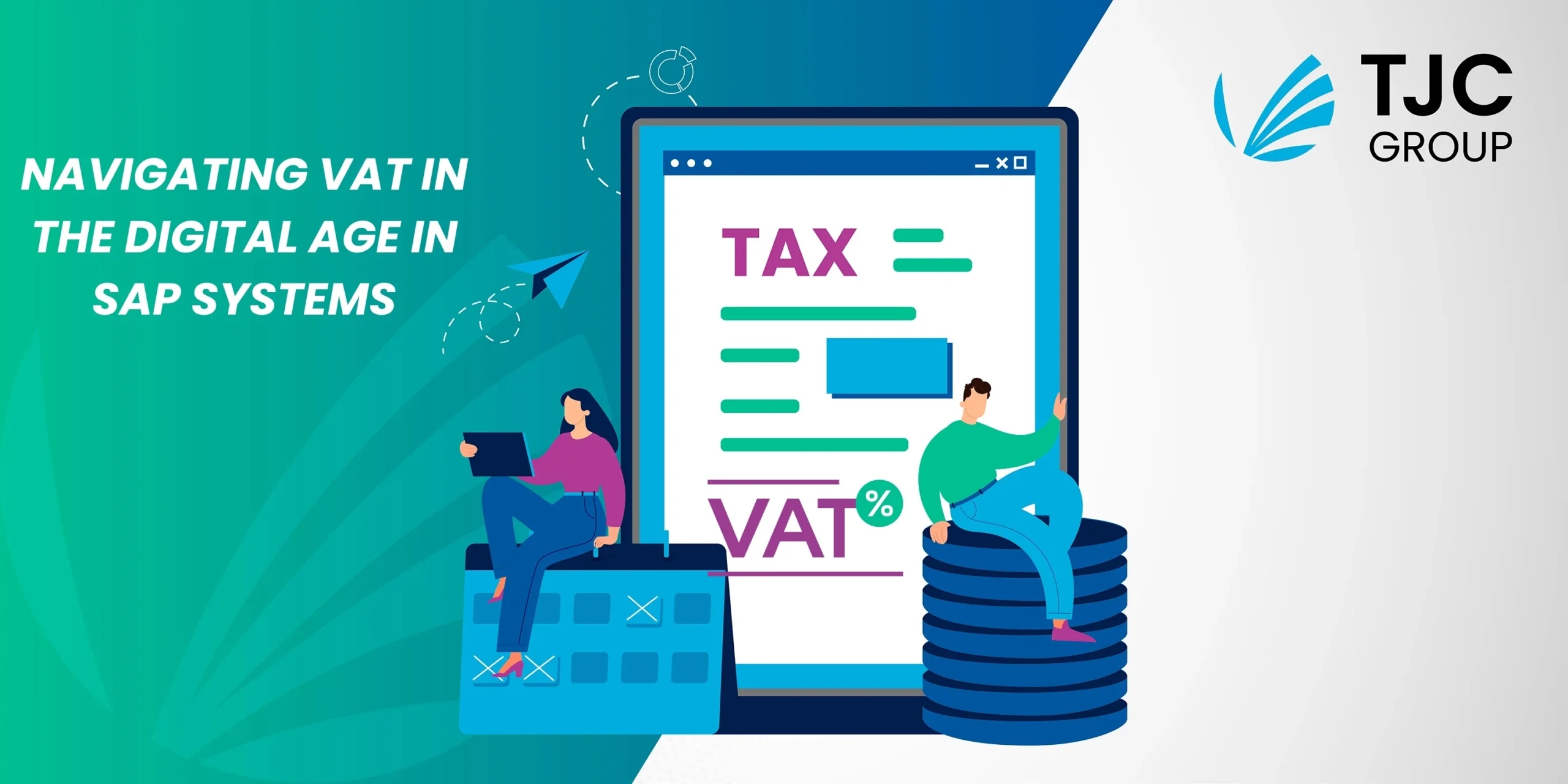Authors: Patchanok Kluabkaew and Graham Little
SAP provides a standard solution to generate the Fichier des Écritures Comptables (FEC) in the DART tool and recommends using DART version 2.7. There are some prerequisites to implement before Tax and Audit teams can actually create the FEC file in DART. The following article provides some guidance on these prerequisites and the steps to be taken to generate the FEC using the DART tool in comparison with the FEC software by TJC, an SAP Certified application that complements SAP tools.
What is the Fichier des Écritures Comptables (FEC)?
The Fichier des Écritures Comptables (FEC) is an audit file for France. From 1st January 2014, it is mandatory for all companies established in France to provide the FEC file to the French Tax Administration in the event of a tax audit. The FEC contains all accounting entries journals for a closed fiscal year and the opening balance complying with French GAAP (PCG and LPF). Upon receiving notice of a tax audit, a company has 15 days to prepare and remit the FEC file. In case of failing to deliver the FEC file or in the event of non-compliance, companies could face significant penalties up to € 5000.
Hence, all companies must ensure to place the appropriate mechanism to generate the FEC file before receiving a notification from the French Government.
Further information about the legal requirements can be found in the Article A47 A-1 of the French Tax regulation.
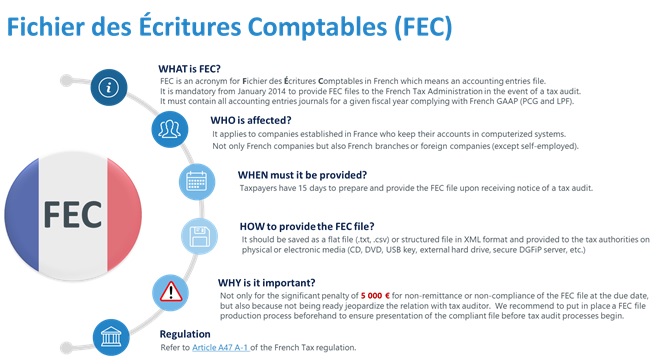
The FEC file format requires 18 fields of accounting entries information as depicted in the table below.
| No. | Information | Field Name | Field Type |
| 1 | The journal entry code | JournalCode | Alphanumeric |
| 2 | The journal entry name | JournalLib | Alphanumeric |
| 3 | The number of accounting entry (continuous number sequence) | EcritureNum | Alphanumeric |
| 4 | The posting date | EcritureDate | Date |
| 5 | The account number.the first three characters must comply with French accounting standard | CompteNum | Alphanumeric |
| 6 | The account name, in accordance with French accounting standard | CompteLib | Alphanumeric |
| 7 | The sub ledger account number (blank if not used) | CompAuxNum | Alphanumeric |
| 8 | The sub ledger account description (blank if not used) | CompAuxLib | Alphanumeric |
| 9 | Reference of the supporting document | PieceRef | Alphanumeric |
| 10 | Date of the supporting document | PieceDate | Date |
| 11 | Description of the accounting entry | EcritureLib | Alphanumeric |
| 12 | The debit amount | Debit | Number |
| 13 | The credit amount | Credit | Number |
| 14 | The lettering of the accounting entry (blank if not used) | EcritureLet | Alphanumeric |
| 15 | The lettering date (blank if not used) | DateLet | Date |
| 16 | The validation date of the accounting entry | ValidDate | Date |
| 17 | Amount in currency (blank if not used) | Montantdevise | Number |
| 18 | Currency code (blank if not used) | Idevise | Alphanumeric |
How to generate a FEC file from the SAP system?
SAP provides the solution to generate a FEC file in the DART tool and recommends using DART version 2.7. There are some prerequisite tasks to follow:
- Implement SAP notes with the latest version in the correct order. You can find a list of SAP notes and the implementation order in note 2162977. The number of notes depends on your SAP version. If your system is ECC6, you could need as many as 39 notes to implement.
- Configure the DART view to meet the French legal requirements for the FEC file and your company requirements (if any). You can find more details in SAP note 1923322. The standard data view is 2FR_FI01 “DART: FI Transaction data for France legal requirements.”
- Customize document type and G/L account creation for opening balance postings.
Before creating the FEC file, one must post the opening balance, as mentioned in Article A47 A-1 of the French Tax regulation. To do so, run transaction FAGL_FR_03 (this is applicable for classical GL). This program will post statistical documents (status BSTAT ‘O’) in period ‘00’. This process should be done after the year-end process completion. We recommend verifying opening balances from postings, reverse, and re-postings in case of unexpected results.
Next, we can start creating the FEC file in DART. Follow the next steps:
- First, run transaction FTW1A to create data extracts for all accounting entries postings for a given fiscal year and opening balance documents, as mentioned in the prerequisite tasks, then select FR as the key language and choose “Finance documents (FI), and Open Items list (FI) under Transaction Data section.
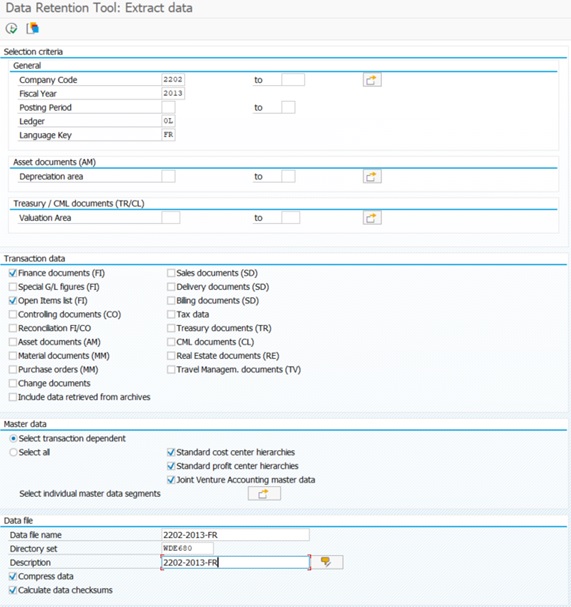
- Second, schedule the view 2FR_FI01 and create the FEC file with transaction FTWH.
- The source extract is the data file name from the previous step.
- The file name format must be SIREN number + FEC + Closing Date. For example: 112233444FEC
- Under Export to File, choose the radio button “French file format”.
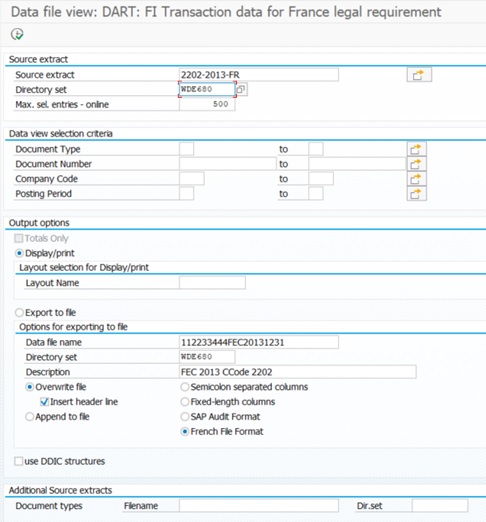
- As a result, you can find your generated data using transactions. Verify the result and extract the FEC file. You can display the data via List and export the file as a local file with extension .txt.

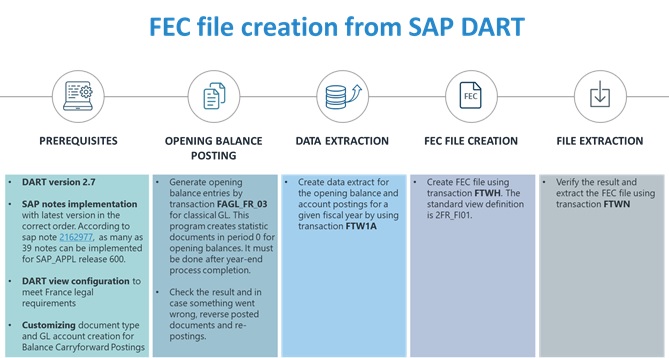
Reference SAP Notes:
1933144 – Article L47 A I of the French Tax regulation effective 01.01.2014
1951943 – DART: France Legal Requirement FAQ note
1923322 – DART: View file creation for France Legal Requirement
2162977 – DART: Order of implementation of notes for FEC
How to do a technical validation?
“Test Compta Demat” is a free FEC testing tool to validate the file structure and specifies the anomaly points detected to be compliant from a technical perspective.
You can download “Test Compta Demat” from the following link: https://www.economie.gouv.fr/dgfip/outil-test-des-fichiers-des-ecritures-comptables-fec
You can find out more on how to create and submit the FEC file in this Expert Guide to International Compliance.

An “Out of the Box” solution to easily generate the FEC file
The generation of the FEC file is a cumbersome process that requires time and niche knowledge. At TJC Group we know that and that is why we have worked hand in hand with our clients to develop a straightforward software solution to simplify the process. If you are not familiar with DART or you do not have the resources to implement all prerequisites properly, the FEC 4.0 by TJC is an SAP Certified software that helps SAP customers overcome Audit and Tax challenges, not only for the FEC in France but also to meet other OECD countries’ requirements through a SAF-T (Standard Audit File for Tax) package.
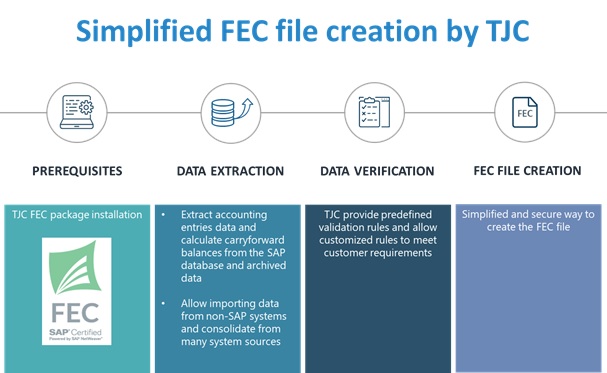
The FEC by TJC was developed in collaboration with one of the Big Four audit firms to simplify extraction and produce compliant files according to the FEC requirements without impacting your SAP system’s performance.
It can make deliver massive time savings and reduce implementation costs. Moreover, we provide predefined validation rules to ensure technical compliance, and all customers can define custom rules to meet their business requirements.
Since 2013, the TJC FEC solution has been successfully used by more than 400 SAP customers, which allows TJC to improve this solution, particularly for their business needs continually. The latest release, the FEC 4.0, provides a user-friendly interface with Fiori design and is compatible with SAP versions from ECC6 to S/4HANA UI5.
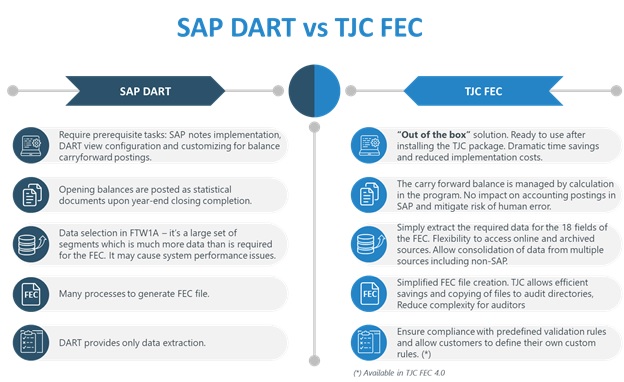
Wrap-up and Conclusion
If you are not familiar with DART or you do not have the resources to implement all prerequisites properly, the FEC software solution by TJC is good support for tax and audit professionals, particularly when having to meet the tight deadlines imposed by the French Tax Authorities.

Watch this video to find out the benefits of the FEC solution by TJC in or get in touch with us to request a demo.

Sources of information:
- Article A47 A-1 of the French Tax regulation: https://www.legifrance.gouv.fr/affichCodeArticle.do;jsessionid=1D905278ED63729D4CDF44E8064D8160.tpdila07v_3?idArticle=LEGIARTI000027804775&cidTexte=LEGITEXT000006069583&categorieLien=id&dateTexte=20150610
- “Test Compta Demat” FEC testing tool: https://www.economie.gouv.fr/dgfip/outil-test-des-fichiers-des-ecritures-comptables-fec
- SAP Help Data Retention Tool (DART): https://help.sap.com/viewer/12d822d6709e480ea991fb53fd941576/6.18.14/en-US/6f96c2531bb9b44ce10000000a174cb4.html
- SAP Note 1933144- Article L47 A I of the French Tax regulation effective 01.01.2014: https://launchpad.support.sap.com/#/notes/1933144
- SAP Note 1951943 – DART: France Legal Requirement FAQ note: https://launchpad.support.sap.com/#/notes/1951943
- SAP Note 1923322 – DART: View file creation for France Legal Requirement: https://launchpad.support.sap.com/#/notes/1923322
- SAP Note 2162977 – DART: Order of implementation of notes for FEC: https://launchpad.support.sap.com/#/notes/2162977
- FEC solution by TJC: https://www.tjc-group.com/products/fec


